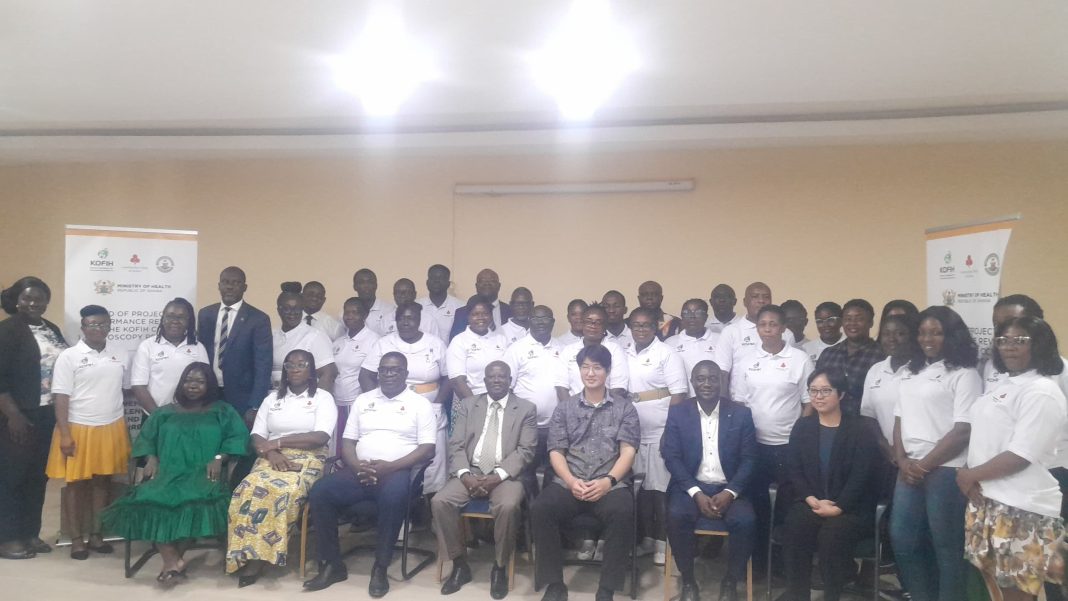By Prince Acquah
Cape Coast, Nov 02, GNA-The Cape Coast Teaching Hospital (CCTH) has successfully established itself as a laparoscopic centre, following the successful completion of a two-year laparoscopy project with the Korea Foundation for International Healthcare (KOFIH).
This means that the hospital has now developed the capacity to undertake laparoscopic surgeries with its services currently opened to the public.
Laparoscopy refers to a “minimally invasive” surgical technique that uses small cuts and long, thin instruments with a camera to undertake procedures in the body, reducing pain, recovery time, and complications.
The KOFI-CCTH laparoscopic project was aimed at providing high-quality medical services through strengthened laparoscopic surgery capacity and enhanced hospital management efficiency through improved bed utilisation and reduced patient length of stay post-surgery.


Hitherto, the hospital had no laparoscopic surgical services with limited human resource capacity in the specialised area.
Through the project, however, CCTH has now established a laparoscopy centre and trained some 31 staff including surgeons, anaesthetists, nurses and biomedical engineers in laparoscopic procedures, making the hospital the only facility in the Central Region with laparoscopic services.
So far, 15 patients have successfully undergone laparoscopic surgeries at the facility under the two-year project, with the hospital acquiring simulation machines to support continuous professional training.
Speaking at the end of its project performance review, Dr Eric Kofi Ngyedu, Chief Executive Officer of CCTH, said the milestone reflected the nation’s ongoing commitment to modernising surgical care and aligning with global trends in minimally invasive procedures.
He said the project sought to create an enabling environment for the training centre and surgical theatre, build staff capacity through training and skills transfer, and provide and monitor laparoscopic surgical services to ensure continuity and quality of care, all of which had been achieved.
He expressed gratitude to KOFIH for their unwavering support and technical expertise, and the Ministry of Health for its policy direction and facilitation.
“Looking ahead, CCTH remains deeply committed to strengthening and expanding laparoscopic services.
“Our vision is to build on this solid foundation, enhance staff capacity further and broaden our equipment base, including the acquisition of advanced anaesthesia machines and other surgical tools,” he said.
Dr Ngyedu noted that the hospital’s commitment to sustaining laparoscopic services had already opened avenues for new partnerships and collaborations as it strived to make CCTH a centre of excellence for laparoscopic surgery and training in Ghana.
Dr Bomin Yang, Country Director, KOFIH, stated that the project was important to enhance the safety of patients with minimally invasive surgery as they recovered faster after surgery.
He said KOFIH provided financial and technical support to ensure the project was successful to position CCTH as the ultimate health care provider.
Dr Yang disclosed that KOFIH was working with several other institutions in Ghana on other projects including mother and child, biomedical engineering and emergency services to improve the country’s health system.
Mr Kafui Akpedonu, Project Coordinator, CCTH, touted the success of the project, but lamented the high cost of consumables and the lack of adequate anaesthesia machines as the major challenges.
“We want to say that this centre has come to stay to serve three catchment regions and we want to expand the base to serve other regions and partners who may want to learn from us,” he said.
Mr Ekow Panyin Okyere Eduamoah, the Central Regional Minister, in a statement read on his behalf, said the introduction of the laparoscopic service represented a quantum leap in health care delivery in Ghana.
He urged CCTH to expand its laparoscopic services and increase awareness on the procedure among the local communities and healthcare providers, indicating that it would stimulate demand for the service.
“I also call on the Ministry of Health and other stakeholders to explore opportunities for sustaining and scaling up this initiative,” he added.
GNA
Edited by Alice Tettey/Lydia Kukua Asamoah
